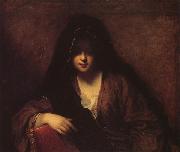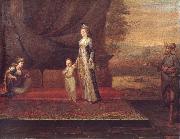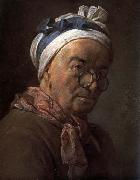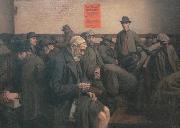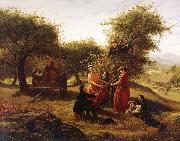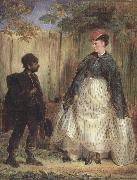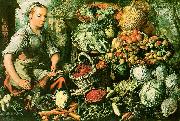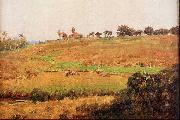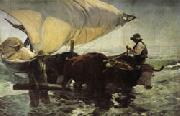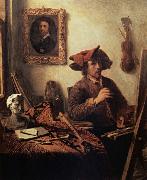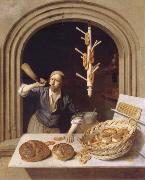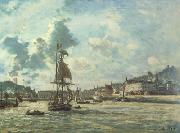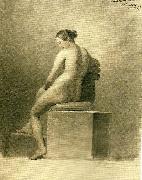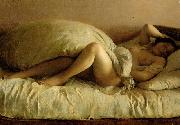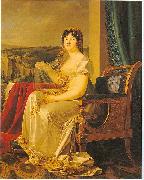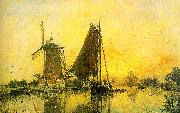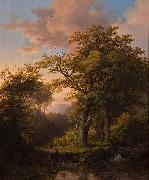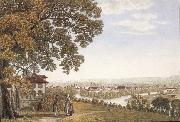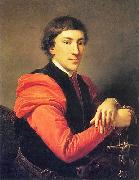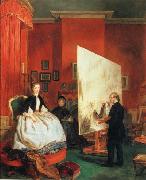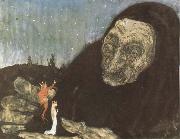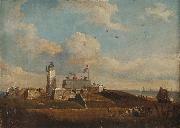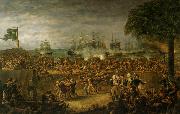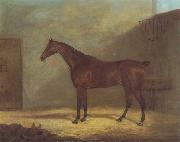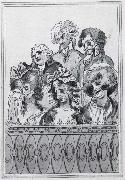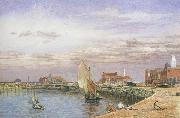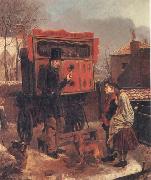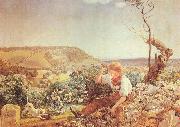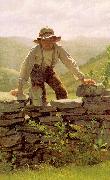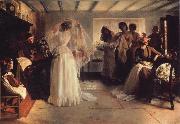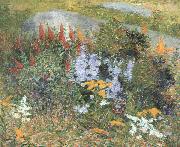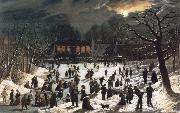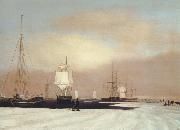|
|
|
|
|
|
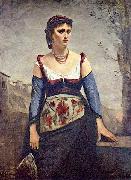 |
Jean-Baptiste-Camille Corot
|
|
was a French landscape painter and printmaker in etching. Corot was the leading painter of the Barbizon school of France in the mid-nineteenth century. He is a pivotal figure in landscape painting and his vast output simultaneously references the Neo-Classical tradition and anticipates the plein-air innovations of Impressionism.
|
|
|
|
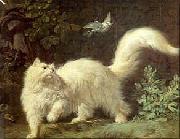 |
Jean-Jacques Bachelier
|
|
(1724 - 1806) was a French painter and director of the porcelain factory at Sevres.
Admitted to the Academie Royale de Peinture et de Sculpture in 1752, he founded an art school using his own means in Paris in 1765 for the artisans in the historic college d'Autun (rue de l'ecole de medecine), which survived until the 19th century.
For a list of works see: Jean-Jacques Bachelier (French edition), including Roman Charity (1765).
|
|
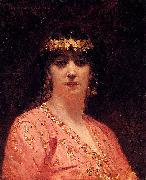 |
Jean-Joseph Benjamin-Constant
|
|
(also known as Benjamin Constant), born Jean-Joseph Constant (10 June 1845 - 26 May 1902), was a French painter and etcher best known for his Oriental subjects and portraits.
Benjamin-Constant was born in Paris. He studied at the Ecole des Beaux-Arts in Paris, where he was a pupil of Alexandre Cabanel. A journey to Morocco in 1872 strongly influenced his early artistic development and lead him to produce Romantic scenes under the spell of Orientalism. Among his noted works in this vein are Last Rebels, Justice in the Harem (both in the Luxembourg Gallery), Les Cherifas, and Moroccan Prisoners (Bordeaux). His large canvas, The Entrance of Mahomet II into Constantinople (Toulouse Museum), received a medal in 1876.
After 1880, he changed his manner, devoting himself to mural decorations and to portraits. Prominent examples include the great plafond in the Hôtel de Ville, Paris, entitled Paris Convening the World; his paintings in the New Sorbonne, representing Literature, The Sciences, and the Academy of Paris; and the plafond of the Opera Comique theatre. He was distinguished as a portrait painter, especially in England, where he was a favorite of the aristocracy. His portrait Mons fils Andra (Luxembourg) was awarded a medal of honor at the Salon in 1896.
Benjamin-Constant painted Pope Leo XIII, Queen Alexandra of England (1901), Lord John Lumley-Savile, and Henri Blowitz (1902). He was made a member of the Institute in 1893, and was a commander of the Legion of Honor. He visited the United States several times, and painted a number of portraits. The Metropolitan Museum of Art in New York owns a large mural decoration by Benjamin-Constant entitled Justinian in Council.
|
|
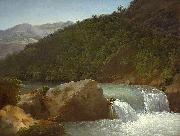 |
Jean-Joseph-Xavier Bidauld
|
|
(1758 - 1846) was a French painter.
A native of the city of Carpentras, Bidauld first studied painting with his elder brother, Jean-Pierre-Xavier, in Lyons. In 1783 he traveled to Paris, there winning the favor of an art dealer and perfume seller named Dulac. This latter subsidized Bidauld's travels in Italy, where for five years he lived in Rome and traveled widely. Most of his contacts within the French artistic community in that city were history painters.
In 1790 Bidauld returned to Paris; in 1791 he entered the Salon for the first time. Thereafter he participated regularly. In 1792 he began receiving official commissions, and in 1823 he became the first landscape painter elected to the Academie des Beaux-Arts. 1825 saw him awarded the Legion d'honneur. His reputation began to decline at about this time; as a member of the Salon jury, he was seen as blocking a new generation of landscape painters from gaining entry. Chief among these was Theodore Rousseau. Bidauld was savaged in the press, and as a result became unable to sell his work. By the time of his death, he was near penury.
|
|
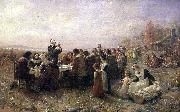 |
Jennie A. Brownscombe
|
|
Jennie Augusta Brownscombe
American, 1850-1936
She has been called "a kind of Norman Rockwell of her era." In fact, the skillful drawing, attention to detail, and nostalgic moods of her paintings make the comparison between Jennie Augusta Brownscombe and the popular American illustrator seem quite apt.
Brownscombe's early life sounds like the story behind one of her own pictures. Born in a log cabin in rural northeastern Pennsylvania, she was the only child of William Brownscombe, an English-born farmer, and Elvira Kennedy, a direct descendant of a Mayflower passenger, who encouraged her young daughter to write poetry and draw. Brownscombe won her first awards as a high school student, exhibiting her work at the Wayne County Fair. When her father died in 1868, Brownscombe began supporting herself through teaching, creating book and magazine illustrations, and selling the rights to reproduce her watercolor and oil paintings as inexpensive prints, Christmas cards, and calendars. More than 100 of Brownscombe's works were distributed this way, spreading her images into homes throughout the nation. |
|
|
|
|
|
|
|
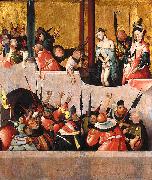 |
Jheronimus Bosch
|
|
c. 1450 - 9 August 1516), was a Dutch painter. His work is known for its use of fantastic imagery to illustrate moral and religious concepts and narratives.
Hieronymus Bosch was born Hieronymus (or Jeroen, respectively the Latin and Middle Dutch form of the name "Jerome") van Aken (meaning "from Aachen"). He signed a number of his paintings as Bosch (pronounced Boss in Middle Dutch). The name derives from his birthplace, 's-Hertogenbosch, which is commonly called "Den Bosch".
Little is known of Bosches life or training. He left behind no letters or diaries, and what has been identified has been taken from brief references to him in the municipal records of 's-Hertogenbosch, and in the account books of the local order of the Brotherhood of Our Lady. Nothing is known of his personality or his thoughts on the meaning of his art. Bosches date of birth has not been determined with certainty. It is estimated at c. 1450 on the basis of a hand drawn portrait (which may be a self-portrait) made shortly before his death in 1516. The drawing shows the artist at an advanced age, probably in his late sixties
|
|
|
|
|
|
|
|
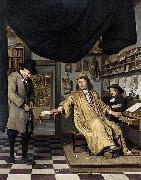 |
Job Adriaenszoon Berckheyde
|
|
(27 January 1630 - 10 June 1698) was a Dutch artist of the 17th century, active in Haarlem, Amsterdam, and The Hague.
Job Berckheyde was born in Haarlem and was the older brother of the painter Gerrit who he later taught to paint. He was apprenticed on 2 November 1644 to Jacob Willemszoon de Wet, and his master's influence is apparent in his first dated canvas, "Christ Preaching to the Children" (1661), one of his few biblical scenes. On 10 June 1653 he repaid a loan from the Haarlem Guild of Saint Luke. From 1656-1660 the two brothers made an extended trip along the Rhine to Germany, stopping off at Cologne, Bonn, Mannheim and finally Heidelberg, following the example of their fellow guild member Vincent van der Vinne. The brothers worked in Heidelberg for Charles I Louis, Elector Palatine (with Job producing portraits and hunting scenes, and receiving a gold chain from the Elector in reward) but were ultimately unable to adapt to court life and so returned to Haarlem, where they shared a house and perhaps a studio. He became a member of the Haarlem rederijkersgilde 'De Wijngaardranken' in 1666-1682. He is registered in Amsterdam 1682-1688, where he became a member of the Guild of St Luke there in 1685-1688.Berckheyde was buried in Haarlem. |
|
|
|
|
|
|
|
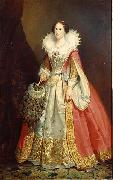 |
Johan Christoffer Boklund
|
|
(15 July 1817 - 9 December 1880) was a Swedish history, genre, and portrait painter from Kulla-Gunnarstorp in Scania.He was the son of a gardener. At the age of fifteen, Boklund came to Lund, where he worked on illustrations for Sven Nilsson's works on Scandinavian fauna (under the supervision of Magnus Körner). He then became a student at the Royal Danish Academy of Fine Arts in Copenhagen where J. L. Lund was his teacher.
In 1837, Boklund went to Stockholm and began studying at the Royal Swedish Academy of Arts. He made a living as a lithograph and drawing teacher, and produced several small genre paintings of the everyday life (such as Flicka med blomster (English: Girl with flowers) and Köksinteriör (English: Kitchen interior)) and history paintings of the 17th century (such as Gustaf Adolfs afsked från Maria Eleonora (English: Gustaf Adolf's farewell from Maria Eleonora), which was awarded with a medal at the academy).
Together with fellow Swedish painter Johan Fredrik Höckert, Boklund traveled to Munich in Germany in 1846 and stayed there for eight years. During the summers he went on study trips to Bavaria, Tyrol, and northern Italy. During this period, Boklund primarily devoted his painting to the history genre with subjects from the 17th century, but he also made some paintings depicting picturesque and architectural interior. In 1853, he sent his painting Den nyfikne trumpetaren (English: The curious trumpet player) home to Sweden and it earned him a scholarship from the government. This allowed Boklund to move to Paris, where he worked at Thomas Couture's atelier from 1854 to 1855. In December 1855 he returned to Sweden. |
|
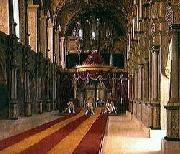 |
Johan Vilhelm Gertner
|
|
(10 March 1818 - 28 March 1871) was a Danish painter, best known for his portraiture. One of the last students of Christoffer Wilhelm Eckersberg, who was known as the father of the Golden Age of Danish Painting, Gertner belonged to the tail end of the Golden Age, a period during which Danish art moved towards a more realistic style, relying on inspiration both from French Realism and emerging photographic techniques.
Gertner was born on 10 March 1818 to a craftsman at the Holmen naval base. He attended the Royal Danish Academy of Fine Arts from 1831 to 1837 where he was one of Christoffer Wilhelm Eckersberg, known as the farther of Goldn Age of Danish Painting. Eckersberg taught him a naturalistic approach to painting, but Gertner went much further with inspiration from French art and the emerging techniques of photography.
His virtuosity in producing almost photographically precise portraits impressed many; in particular, his ability to reproduce textures and materials e crisp silk dresses, lustrous medals and jewellery, dark mahogany furniture, silky wallpapers, and soft carpets e won him much acclaim. Others, such as the influential art historian and critic Niels Lauritz Høyen, who opposed any foreign influence on Danish painting, disapproved of his style, preferring more sincere and sensitive portrayals. He was a professor at the Academy from 1858.
|
|
|
|
|
|
|
|
|
|
|
|
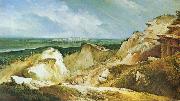 |
Johann Christian Brand
|
|
(March 6, 1722 ?C June 12, 1795)was an Austrian painter (son of the German painter Christian Hilfgott Brand (1694-1756) who taught in Vienna with Karl Aigen) and brother of Friedrich August Brand.Johann Christian Brand influenced ending the baroque era of landscape painting. He died in Vienna.
Johann Christian Brand was born in Vienna on March 6, 1722. Influential in ending the baroque era, Johann studied at the Vienna Academy from 1736.He was awarded with the titles Kammermaler* in 1766 and "Professor of Landscape Drawing" in 1772. |
|
|
|
|
|
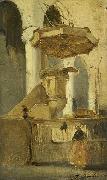 |
Johannes Bosboom
|
|
(born The Hague, February 18, 1817 - died there September 14, 1891) was a Dutch painter and watercolorist of the Hague School, known especially for his paintings of church interiors.
At the age of 14 he became a student of Bartholomeus van Hove and painted in his studio along with Van Hove's son Hubertus van Hove. Together they worked on the pieces of scenery that Van Hove created for the Royal Theatre in The Hague. In addition, Bosboom took lessons from 1831 to 1835 and again from 1839 to 1840 in the Hague Academy of Art. Here he also made the acquaintance of Antonie Waldorp and Wijnand Nuyen.
The young Bosboom traveled to Germany in 1835 to Dusseldorf, Cologne and Koblenz and painted the watercolor View of the Mosel Bridge at Koblenz. This painting was purchased by Andreas Schelfhout, who became his confidante and friend. In 1939 he traveled to Paris and Rouen and received a silver medal for View of the Paris Quay and the Cathedral at Rouen. He also painted a number of church interiors, a relatively traditional genre in which the seventeenth century artists Pieter Saenredam and Emanuel de Witte served as important examples. Bosboom had a great deal of success with these pieces, and for the rest of his career he would repeatedly return to this theme, which was the one in which he would achieve his greatest fame.
Bosboom's choice of subject matter may seem to isolate him from the rest of the Hague School, but his search for ways to reproduce the spatial atmosphere through light, shadow, and nuances of color places him in the very mainstream of this group. In 1873, during a stay in Scheveningen, he painted many watercolors of town views, the dunes, the beach and the sea. It is possible that these watercolors encouraged Hendrik Willem Mesdag and Jacob Maris to concentrate further on the sea and beach as subjects.
|
|
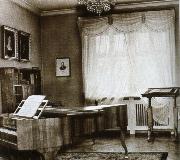 |
johannes brahms
|
|
Born: 7 May 1833
Birthplace: Hamburg, Germany
Died: 3 April 1897 (liver cancer)
Best Known As: German composer of "Brahms' Lullaby" ("Wiegenlied")
|
|
|
|
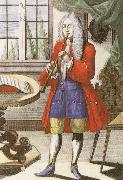 |
john banister
|
|
Banister was a violinist, composer and flageolet player for the English court. Much of his life was astir with accusations and innuendo. Nevertheless, he was able to remain in the King's service until his death and a great demand was laid upon him for his "play" songs. |
|
|
|
|
|
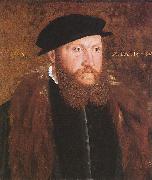 |
John Bettes the Elder
|
|
(active c. 1531 - 1570) was a Tudor artist whose few known paintings date from between about 1543 and 1550. His most famous work is his Portrait of a Man in a Black Cap. His son John Bettes the Younger, with whom he is sometimes confused, was a pupil of Nicholas Hilliard who painted portraits during the reign of Elizabeth I and James I.
Nothing is known of John Bettes's life, except that he was living in Westminster in 1556, according to a documented court case. He is first recorded as working for Henry VIII at Whitehall Palace in 1531. Queen Catherine Parr's accounts for 1546/47 record payments to Bettes for "lymning" (painting in miniature) the king's and queen's portraits, and for six other portraits. Her new year's gift of 1547 to Prince Edward was a pair of portraits of the king and herself. Bettes has been identified as the designer of the engraved title-border for William Cuningham's Cosmographical Glasse, printed by John Day in 1559. He may also be the designer of engravings for Edward Hall's Chronicle, published in 1550, and of a woodcut portrait of Franz Burchard, the Saxon ambassador to England, published in 1560. In 1576, John Foxe referred to Bettes as already dead. An earlier second edition of Foxe's Actes and Monuments printed in 1570 refers to Bettes' death. |
|
|
|
|
|
|
|
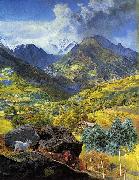 |
John Brett
|
|
John Brett (1831-1902) was an artist associated with the Pre-Raphaelite movement (although is not considered to be a Pre-Raphaelite painter himself), mainly notable for his highly detailed landscapes. Brett was born near Reigate on 8 December 1831, the son of an army vet. In 1851 he began lessons in art with James Duffield Harding, a landscape painter. He also studied with Richard Redgrave. In 1853 he entered the Royal Academy schools, but was more interested in the ideas of John Ruskin and William Holman Hunt, whom he met through his friend the poet Coventry Patmore. Inspired by Hunt's ideal of scientific landscape painting Brett visited Switzerland, where he worked on topographical landscapes and came under the further influence of John William Inchbold.
|
|
|
|
|
|
|
|
|
|
|
|
|
|
|
|
|
|
|
|
|
|
|







